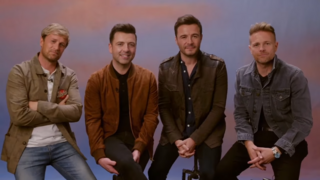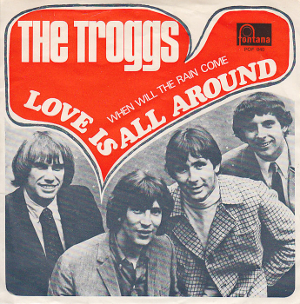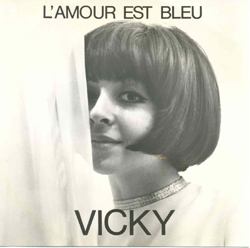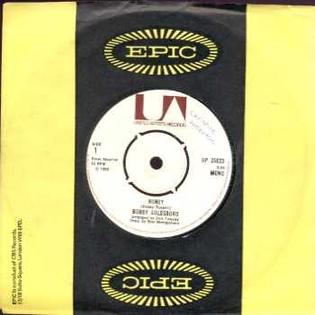
"With a Little Help from My Friends" is a song by the English rock band the Beatles, from their 1967 album Sgt. Pepper's Lonely Hearts Club Band. It was written by John Lennon and Paul McCartney and sung by drummer Ringo Starr, his lead vocal for the album. As the second track on the album, it segues from the applause of the title track.

Westlife are an Irish pop group formed in Dublin, Ireland, in 1998. The group consists of members Shane Filan, Mark Feehily, Kian Egan, and Nicky Byrne. Brian McFadden was a member before leaving in 2004. The group disbanded in 2012 after 14 years and later reunited in 2018.

"Light My Fire" is a song by the American rock band the Doors. Although principally written by the band's guitarist, Robby Krieger, songwriting was credited to the entire band. Recognized as one of the earliest examples of psychedelic rock, it was recorded in August 1966 and released in January 1967 on their eponymous debut album. Due to its erotic lyrics and innovative structure, the track has come to be regarded as synonymous with the '60s psychedelic and sexual revolutions.

"Love Child" is a 1968 song released by the Motown label for Diana Ross & the Supremes. The second single and title track from their album Love Child, it became the Supremes' 11th number-one single in the United States, where it sold 500,000 copies in its first week and 2 million copies by year's end.

"Nights in White Satin" is a song by the Moody Blues, written and composed by Justin Hayward. It was first featured as the segment "The Night" on the album Days of Future Passed. When first released as a single in 1967, it reached number 19 on the UK Singles Chart and number 103 in the United States in 1968. It was the first significant chart entry by the band since "Go Now" and its recent lineup change, in which Denny Laine and Clint Warwick had resigned and both Hayward and John Lodge had joined.

"Those Were the Days" is a song credited to Gene Raskin, who put a new English lyric to the Russian romance song "Дорогой длинною", composed by Boris Fomin (1900–1948) with words by the poet Konstantin Podrevsky. It deals with reminiscence upon youth and romantic idealism. It also deals with tavern activities, which include drinking, singing and dancing.

"I Say a Little Prayer" is a song written by Burt Bacharach and Hal David for Dionne Warwick, originally peaking at number four on the U.S. Billboard Hot 100 pop singles chart in December 1967. On the R&B Singles chart it peaked at number eight.
The Irish Singles Chart is the Republic of Ireland's music industry standard singles popularity chart issued weekly by the Irish Recorded Music Association (IRMA) and compiled on their behalf by the Official Charts Company. Chart rankings are based on sales, which are compiled through over-the-counter retail data captured electronically each day from retailers' EPOS systems. All major record shops, digital retailers and streaming services contribute to the chart, accounting for over 95% of the market. A new chart is compiled and officially released to the public by the Irish Recorded Music Association on Friday at noon. Each chart is dated with the "week-ending" date of the previous Thursday. The singles chart was first published on 1 October 1962, and covered the top ten singles of the previous week by record label shipments.

"Love Is All Around" is a song recorded by English rock band the Troggs. Released as a single in October 1967, it was a top-ten hit in both the UK and US.

"L'amour est bleu" is a song whose music was composed by André Popp, and whose lyrics were written by Pierre Cour, in 1967. Bryan Blackburn later wrote English-language lyrics for it. First performed in French by Greek singer Vicky Leandros as the Luxembourgish entry in the Eurovision Song Contest 1967, it has since been recorded by many other musicians, most notably French orchestra leader Paul Mauriat, whose familiar instrumental version became the first number-one hit by a French lead artist to top the Billboard Hot 100 in America.

"Honey", also known as "Honey (I Miss You)", is a song written by Bobby Russell. He first produced it with former Kingston Trio member Bob Shane, who was the first to release the song. It was then given to American singer Bobby Goldsboro, who recorded it for his 1968 album of the same name, originally titled Pledge of Love. Goldsboro's version was a hit, reaching No. 1 in several countries.

"Piece of My Heart" is a romantic soul song written by Jerry Ragovoy and Bert Berns, originally recorded by Erma Franklin in 1967. Franklin's single peaked in December 1967 at number 10 on the Billboard Hot Rhythm & Blues Singles chart in the United States.

"I'll Never Fall in Love Again" is a popular song by composer Burt Bacharach and lyricist Hal David that was written for the 1968 musical Promises, Promises. Several recordings of the song were released in 1969; the most popular versions were by Dionne Warwick, who took it to number 6 on Billboard magazine's Hot 100 and spent three weeks topping the magazine's list of the most popular Easy Listening songs, and Bobbie Gentry, who topped the UK chart with her recording and also peaked at number 1 in Australia and Ireland, number 3 in South Africa and number 5 in Norway.
"Lily the Pink" is a 1968 song released by the UK comedy group The Scaffold, which reached No. 1 in the UK Singles Chart. It is a modernisation of an older folk song titled "The Ballad of Lydia Pinkham". The lyrics celebrate the "medicinal compound" invented by Lily the Pink, and humorously chronicle the "efficacious" cures it has brought about, such as inducing morbid obesity to cure a weak appetite, or bringing about a sex change as a remedy for freckles.

"Young Girl" is a RIAA million-selling Gold-certified single that was written, composed, and produced by Jerry Fuller and performed by Gary Puckett & The Union Gap with instrumental backing by members of "The Wrecking Crew". It was released in 1968.
"Am I That Easy to Forget" is a popular song written by country music singer Country Johnny Mathis who later sold the publishing rights to W.S. Stevenson and published in 1958. Belew recorded his song in Nashville on December 17, 1958, and released the single in March 1959, when it reached number nine on the U.S. country music chart. Other country music artists who have recorded cover versions of the song include Skeeter Davis, Ernest Tubb (1960), Jerry Wallace (1962), Gene Vincent (1966), George Jones (1967), Patti Page (1968), Ann-Margret & Lee Hazlewood (1969), Jim Reeves and Prairie Oyster (1991).
"Ice in the Sun" is a song by the band Status Quo. The track was recorded in 1968, and appeared on Picturesque Matchstickable Messages from the Status Quo, an album by Status Quo that was released in August that year.

"Love of the Common People" is a song written by John Hurley and Ronnie Wilkins, eventually released in 1970 on John Hurley's album John Hurley Sings about People, but first sung in January 1967 by the Four Preps. The Four Preps' recording was not a hit, but, later in 1967, the Everly Brothers and Wayne Newton would each issue their versions of the song, both of which "bubbled under" in the US charts; Newton's version peaked at No. 106, the Everlys' at No. 114. However, the Everly Brothers' recording was a major hit in Canada, peaking at No. 4. In 1968, Irish artist Joe Dolan and backing grouping the Drifters recorded a version which hit the top 10 on the Irish Singles Chart, but did not chart elsewhere.

"I Just Can't Help Believing" is a song written by Barry Mann and Cynthia Weil.